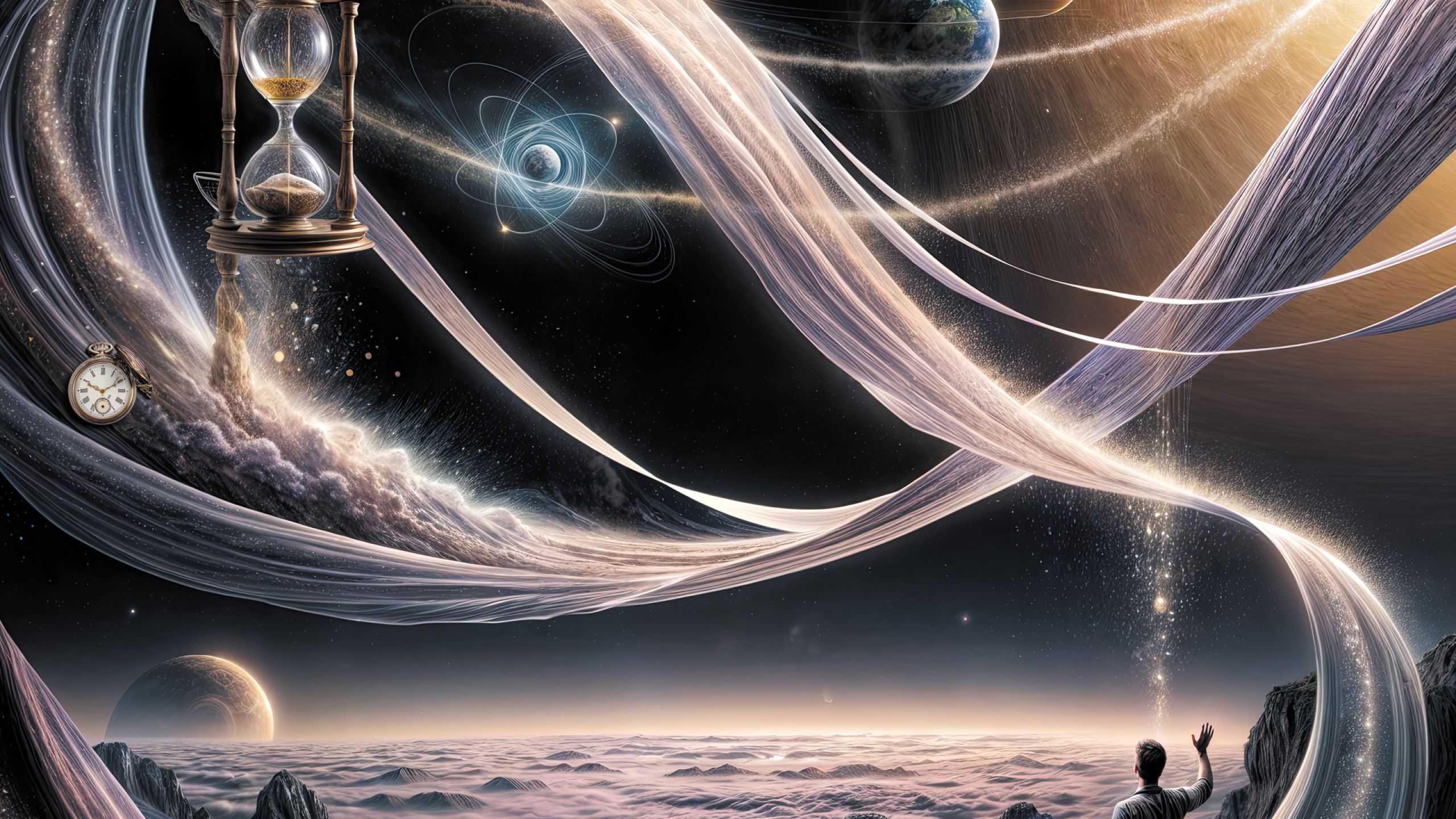The Concept of Time

In This Article
-
Questions about time have sparked philosophical debates, inspired scientific investigations, and fueled artistic and cultural expressions throughout history.
-
The question of how time began or whether it had a specific start is still an area of active research and speculation in cosmology and theoretical physics. In the context of the universe, the scientific discussions on the start of time are closely related to the concept of the origin of the universe itself.
-
The main question physicists study is whether time is a reality or an illusion. Time is commonly regarded as a fundamental concept, existing independently and not composed of or reliant on anything else.
Throughout the history of humanity, one of the things we have found difficult to comprehend and unravel is undoubtedly the concept of time. On one hand, it appears to flow inexorably and irreversibly, intertwined with everything, exhibiting a certain continuity that encompasses life itself, and connecting to all things. Thus, time is the most comprehensive thing in the entirety of the universe, bearing witness to all changes in the cosmos, currently witnessing, and destined to witness, and touching everything, playing a role in their existence. On the other hand, being an abstract concept, we cannot physically touch it; we can only grasp its effects. It remains at the center of debates concerning the entire existence, the origin of everything, and the course of events. In this article, we will embark on a journey into our perception of time and attempt to explain the concept of time from various perspectives and within the framework of questions we pose about it.
Humanity has been fascinated by the concept of time for centuries, and various questions about time have been dwelled on by philosophers, scientists, and individuals from different disciplines and across different cultures. Its definition varies across different subjects, where it serves as a key factor in understanding the concept itself. Some of the questions under various categories include the following:
- What is (the nature of) time?
- Is it a fundamental property of the universe, or is it a human construct?
- What is the beginning of time?
- Does it have an end?
- Did time exist before the universe, and will it continue to exist after the universe?
- Is time an illusion or a subjective experience?
- How does our perception of time relate to its objective nature?
- What is the definition of time in classic physics and quantum physics?
- How does time flow?
- Does it have a consistent direction, or can it flow backward or in multiple directions?
- How does time relate to causality and the arrow of time?
- Why do events unfold in a particular sequence?
These questions reflect the complex and multifaceted nature of our curiosity about time. They have sparked philosophical debates, inspired scientific investigations, and fueled artistic and cultural expressions throughout history. Discussing and offering effective answers to all these questions is not possible in a single article, so we cover only some of them in this article.
How did time begin?
The question of how time began or whether it had a specific start is still an area of active research and speculation in cosmology and theoretical physics. In the context of the universe, the scientific discussions on the start of time are closely related to the concept of the origin of the universe itself. The widespread scientific model, known as the Big Bang Theory, suggests that the universe began with a singularity – a point of infinite density and temperature – approximately 13.8 billion years ago. According to this theory, time as we know it began with the expansion of the universe from this singularity. However, the exact nature of the singularity and what happened prior to the Big Bang remains uncertain. The question of what caused the Big Bang or what existed before it is still a mystery. As we will explain below, some scientific discussions and theories propose alternative models, such as the idea of a cyclic universe or the concept of a multiverse, where time may have different properties or may not have a distinct beginning in the traditional sense.
We follow a way to explain the concept of time by answering some of the questions stated above on five different levels.
Level 1
The concept of time refers to the measurement of the progression of events, durations, or intervals between two or more points. Thus, time is often divided into smaller units such as seconds, minutes, hours, days, months, and years to facilitate its measurement and organization. Currently, with the help of the technology we achieved, it is possible to measure time with precision up to approximately 10-15 seconds, equivalent to an error of around 1 second in roughly 30 million years (NIST website).
Level 2
In Physics, time is one of the most interesting quantities (or concepts), maybe the most interesting one, having very different aspects and perceptions. It is a fundamental dimension in which events occur and can be described as a continuous forward flow from the past through the present to the future. It is considered one of the four dimensions in the fabric of spacetime, along with three spatial dimensions. We believe that it is important to mention a few of them to help the readers enhance their understanding of time. In general, there are three main concepts of time that are still used and defined separately: the time concept in Newtonian mechanics (non-relativistic time in classical physics), the time concept in Einstein’s special theory of relativity, and the time concept in his general theory of spacetime and gravitation.
In classical physics, time is considered as an absolute and invariable concept as a fundamental quantity. This implies that all clocks tick at the same rate and that everyone’s experience of time is the same. Another important point is that classical physics does not define an arrow of time (we will discuss the concept of the arrow of time in detail later). On the other hand, the modern understanding of time, as introduced by Einstein's theory of relativity, shows that time passes at different rates depending on relative motion or gravitational field strength, introducing the concept of time dilation (Einstein, 1905), which means that time is relativistic, like distance, and both may change with the speed of a moving reference frame.
In quantum physics, time is not a central concept as it is in classical physics. Unlike most other aspects of reality, time is not quantized. However, quantum mechanics incorporates the concept of time in describing the evolution of quantum systems and the measurement of physical quantities. Overall, the theories and models within these areas of physics provide frameworks for exploring and describing time. However, there are still many questions that remain unanswered within areas of active research, such as the nature of time itself, the quantum behavior of spacetime, and the possibility of a unified theory that encompasses all fundamental aspects of reality (Smolin, 2001).
Level 3
We can say that Physics is the only branch of science that explicitly studies time. However, even physicists agree that time is one of the most difficult properties of our universe to understand. The main question they study is whether time is a reality or an illusion. Time is commonly regarded as a fundamental concept, existing independently and not composed of or reliant on anything else. Regarding the fundamental concept of time, the “arrow of time” has gained a comprehensive framework. It encompasses various aspects of time-related phenomena, including the asymmetry of physical processes, our subjective experience of time, and the fundamental laws of physics. As discussed by Stephen Hawking (Hawking, 1998), the principles of science make no distinction between time moving forward or backward. Nonetheless, there exist at least three distinct arrows of time that differentiate between the past and the future. These arrows include the thermodynamic arrow, indicating the direction in which disorder increases; the psychological arrow, marking the direction in which we retain memories of the past but not the future; and the cosmological arrow, signifying the direction in which the universe expands as opposed to contracting. Research has demonstrated that the psychological arrow essentially aligns with the thermodynamic arrow, ensuring they consistently point in the same direction. In this context, profound philosophical and cosmological questions remain, such as whether there could be a reversal of the arrow of time, whether there are regions of the universe where time behaves differently, and whether time itself has a fundamental structure.
Level 4
The religious perspective: the concept of time in the religious perspective varies across different religions and belief systems. Time usually carries significant meaning and symbolism in religious traditions and is often intertwined with theological, spiritual, and cosmological concepts. We will address a few general aspects here.
(a) Linear or cyclical time: Many religions view time as either linear or cyclical. Linear time suggests a progression from beginning to an end, often associated with a divine plan or purpose unfolding over time. For instance, in monotheistic religions like Christianity, time is seen as moving from creation to a final judgement and the establishment of an eternal afterlife. Cyclical time, on the other hand, involves the repetition of events or cycles, symbolizing concepts like reincarnation or eternal recurrence as in some Eastern religions, such as Hinduism and Buddhism.
(b) Sacred time: Certain religious traditions consider specific periods of time to be sacred or marked by special events. Examples include holy days, festivals, or specific times for prayer, fasting or pilgrimage. These designated times hold religious significance and are observed with specific rituals or practices.
(c) Timelessness: Some mystical or transcendental perspectives view time as an illusion or an incomplete understanding of reality. This coincides with the discussion in physics mentioned above in level 3. In these beliefs, there may be concepts of an eternal, timeless realm beyond the limitations of ordinary time and space. These notions can be found in various mystical branches of different religions.
(d) Divine intervention: Some religious traditions believe in divine intervention, where time is seen as influenced or even manipulated by a higher power. Miracles or prophecies are seen as instances where the normal flow of time is altered or suspended.
Level 5
The Qur’anic (Islamic) perspective of time: The concept of time is mentioned in various contexts in the Qur’an, reflecting its significance in Islamic theology and guidance for believers. Here we will speak of a few concepts.
(a) The Qur’an emphasizes that time is created, and that God is the Creator of time and the universe, highlighting God’s control over time (7:54). It mentions the creation of the heavens and the earth, the alternation of night and day, and the celestial bodies as signs of God’s power and wisdom. The concept of the Day of Judgement is also prominent, highlighting the belief in a future event where all beings will be held accountable for their actions in the temporal world.
(b) Limited time and the purpose of life (103: 1-3): The Qur’an emphasizes the fleeting nature of human life and the importance of utilizing time wisely. It encourages believers to reflect on the brevity of life and to make the most of their time in pursuing righteous deeds and seeking closeness to Allah. It urges believers not to be distracted by worldly matters but to focus on their ultimate purpose and the eternal life to come.
(c) Seasonal changes and natural signs: The Qur’an mentions the changing seasons, agricultural cycles, and natural phenomena as signs of God’s existence and power. These references highlight the temporal nature of these phenomena and serve as reminders of the Creator’s mastery over time and the universe.
(d) Patience and perseverance: The Qur’an emphasizes the virtue of patience and perseverance in facing life’s challenges and trials. It teaches believers to endure hardship with patience and trust in God’s plan, recognizing that time brings about changes and tests, and that steadfastness during difficult times is rewarded.
(e) Relativity of time: In exploring the sacred texts and grappling with our perception of time as human beings, it becomes imperative to consider the concept of God’s transcendence from time. This notion, emphasized particularly in the Qur’an, underscores the relativity of time. What may seem like extensive periods for us are but fleeting moments in the sight of God. The following Qur’anic verses highlight this temporal relativity, such as the reference in Surah Al-Ma'arij (70:4) where it is stated, "The angels and the Spirit ascend to Him during a Day the extent of which is fifty thousand years," and in Surah As-Sajda (32:5) where it is mentioned, "He arranges [each] matter from the heaven to the earth; then it will ascend to Him in a Day, the extent of which is a thousand years of those which you count." These verses elucidate the profound relativity of time, elucidating its paramount importance in understanding divine discourse.
In conclusion, the exploration of time remains an ongoing odyssey, encompassing both scientific inquiry and religious contemplation. On the one hand, scientific endeavors persistently strive to unravel the complexities of time, building our understanding on the strongest available evidence and theories, which will adapt and evolve over time with the advancement of knowledge. The quest for time's origin and its intricate relationship with the universe remains an ever-unfolding pursuit. On the other hand, religious texts offer a distinct perspective. Concepts like God’s transcendence of time, emphasized in the Qur’an, remind us of the relativity of our human experience. Vast stretches of time for us are mere moments from God's perspective. Qur’anic verses illustrate this profound temporal relativity, highlighting its importance in interpreting divine discourse. Both scientific and religious perspectives on time help us gain a richer and more nuanced understanding of this fascinating concept.
References
- The National Institute of Standards and Technology (NIST) website, "How Do You Measure a Second?" (https://www.nist.gov/si-redefinition/second-introduction).
- Einstein, Albert (1905). On the electrodynamics of moving bodies. Annalen der Physik, 17(8), 891-921.
- Smolin, Lee (2001). Three roads to quantum gravity: A new perspective on the physics of the universe. Basic Books.
- Stephen Hawking (1998). A brief history of time.









